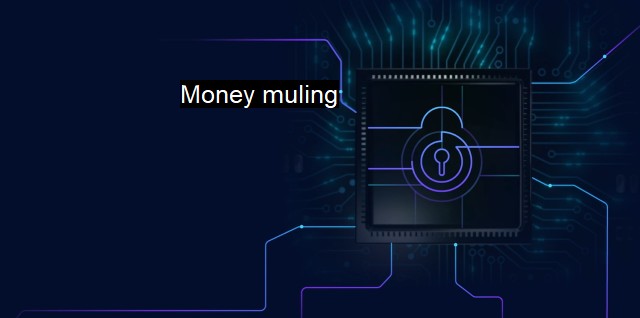What is Money muling?
Uncovering the Dangers of Money Muling: How Cybercriminals are Using Unsuspecting Individuals to Launder Ill-Gotten Gains
Money muling is a type of fraudulent activity commonly associated with cybercrime that centers around the illegal movement of money. The term 'mule' is borrowed from the illegal drug trade where 'drug mules' are people used to transport illicit drugs across borders. In the case of money muling, the mules are used to move illegally obtained money through legitimate banking or financial systems, making it difficult for authorities to trace the origin of the funds.Money muling constitutes an integral part of the cybercrime ecosystem. An example of a typical money muling operation might include a cybercriminal who has infiltrated a business network, stealing financial details or spreading ransomware that forces the business to pay a sum of money in order to regain control of their systems.
These stolen funds or payments cannot be directly transferred into the criminal's account due to mechanisms in place that work to detect suspicious activities. This is where the 'money mules' come in. The money mule's account acts as an intermediary, receiving the stolen funds before transferring them to the cybercriminal's account.
Throughout this process, the funds are often moved across several 'mule' accounts to further evade detection, and in many instances, the mules keep a small portion of the money as their payment. While this activity is clearly illegal and punishable under the law, many people unknowingly become money mules after falling victim to manipulative tactics used by cybercriminals. These tactics include online job postings for ‘money transfer agents’ or ‘payment processing agents’, cyber-romance schemes, lotteries, and so forth.
Understanding the damaging role of money muling in today's economic environment, in particular, the financing of criminal and potentially terrorist activities, makes its prevention a high priority within the context of cybersecurity. The role of antivirus and other cybersecurity software in hindering money muling operations is twofold.
First, antivirus and cybersecurity tools provide protection against the initial infiltration attempts by cybercriminals. These can include various phishing and spoofing tactics that trick individuals or businesses into revealing sensitive information, like account details and passwords. Once such information is obtained, cybercriminals can either drain these accounts directly or use them as potential mule accounts.
Second, antivirus and cybersecurity software can assist by identifying and alerting users to possible money muling activity on their systems, such as unusual transfer patterns or connections to known cybercriminal IP addresses.
In addition to software solutions, education and awareness are paramount in the prevention of money muling. Thus, individuals and businesses are continuously being imparted the knowledge on how to protect themselves against cybercrime. This includes recognizing red flags such as unsolicited job offers involved in moving funds, pressure to wire funds quickly, or transactions aimed seemingly towards locations with limited regulation or control.
While the sophistication and reach of cybercrime and money muling continue to expand, a combination of advanced antivirus protection and user education can substantially help hinder its growth. It's crucial to remain abreast of the latest cybersecurity threats and maintain robust antivirus protection to prevent becoming another link in the cybercriminal's chain. It is important to understand that anyone who participates knowingly or unknowingly in money muling is perpetuating cybercrime and can share in the legal consequences.

Money muling FAQs
What is money muling?
Money muling is a type of financial fraud where a person is recruited to transfer illegally obtained money between bank accounts or countries to evade detection.Is money muling illegal?
Yes, it is illegal to participate in money muling. It can result in criminal charges, fines, and even imprisonment.How can I protect myself from becoming a money mule?
Avoid job offers or opportunities that promise quick cash for transferring money or opening bank accounts. Also, be wary of unsolicited emails, messages, or calls from strangers asking for your bank account details or requesting financial transactions.What should I do if I suspect I'm being used as a money mule?
If you suspect you have become a money mule, stop all communication with the person who recruited you and report it immediately to your bank, local law enforcement, or antivirus provider. They will guide you on the necessary steps to take to protect yourself from further fraud or legal consequences.| | A | | | B | | | C | | | D | | | E | | | F | | | G | | | H | | | I | | | J | | | K | | | L | | | M | |
| | N | | | O | | | P | | | Q | | | R | | | S | | | T | | | U | | | V | | | W | | | X | | | Y | | | Z | |
| | 1 | | | 2 | | | 3 | | | 4 | | | 7 | | | 8 | | |||||||